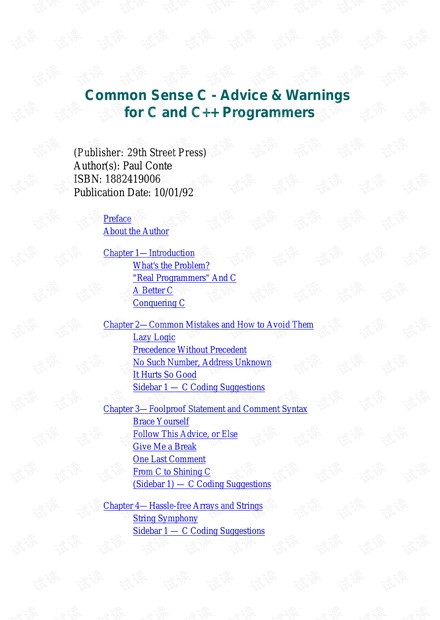common-sense-c-advice-and-warnings-for-c-and-c-programmers.97818...
### Common Sense C: Advice and Warnings for C and C++ Programmers #### Introduction "Common Sense C: Advice and Warnings for C and C++ Programmers" is a comprehensive guide aimed at helping programmers navigate the complexities and pitfalls of the C and C++ languages. Written by Paul Conte and published by 29th Street Press in 1992, this book serves as an invaluable resource for both experienced developers and newcomers to the C family of programming languages. #### Chapter 1: Introduction In the introductory chapter, the author highlights the challenges that come with programming in C, particularly due to its low-level nature and lack of built-in safeguards against certain types of errors. The chapter also emphasizes the importance of "real programmers" embracing best practices and adopting a better approach to C programming, which can help conquer the language and its associated challenges. #### Chapter 2: Common Mistakes and How to Avoid Them Chapter 2 delves into common mistakes made by C and C++ programmers. It covers issues such as lazy logic, where programmers may overlook logical errors or assume that their code will work without thorough testing. Another topic discussed is the misuse of operator precedence, which can lead to unexpected results if not properly understood. Additionally, the chapter addresses the dangers of uninitialized variables and the importance of careful memory management. The sidebar in this chapter provides specific coding suggestions to help avoid these pitfalls. #### Chapter 3: Foolproof Statement and Comment Syntax In Chapter 3, the focus shifts to statement and comment syntax. This includes advice on how to properly use braces to ensure code clarity and maintainability. The chapter also covers the importance of following consistent coding conventions, including the use of comments that provide meaningful context rather than simply restating what the code does. The chapter concludes with a discussion on how to transition from basic C to more advanced usage, emphasizing the importance of evolving coding practices. #### Chapter 4: Hassle-Free Arrays and Strings Chapter 4 focuses on arrays and strings, two fundamental data structures in C and C++. Topics include the proper handling of string operations to prevent buffer overflows, a common security vulnerability. The chapter also explores techniques for efficiently managing arrays and strings, such as using the `strcpy` and `strcat` functions safely. A sidebar in this chapter offers additional coding suggestions for working with these data structures. #### Chapter 5: Simplified Variable Declarations In Chapter 5, the author discusses simplified variable declarations. This includes guidelines for naming conventions, scoping rules, and the importance of declaring variables as close to their point of use as possible. The chapter aims to help programmers write clearer and more maintainable code by avoiding unnecessary complexity in variable declarations. #### Chapter 6: Practical Pointers Chapter 6 is dedicated to pointers, a powerful but potentially dangerous feature of C and C++. Topics covered include pointer arithmetic, dereferencing, and common pitfalls like dangling pointers and memory leaks. The chapter also provides practical tips for working with pointers, including the use of null pointers for safety and the importance of freeing dynamically allocated memory. #### Chapter 7: Macros and Miscellaneous Pitfalls Chapter 7 explores macros and other miscellaneous pitfalls. Macros, while useful for simplifying code, can introduce bugs if not used carefully. The chapter covers best practices for defining and using macros, including the importance of understanding macro expansion. Other topics include avoiding common pitfalls related to preprocessor directives and understanding the nuances of macro behavior. #### Chapter 8: Working with C++ Chapter 8 transitions to C++, discussing the differences and similarities between C and C++. Topics include object-oriented programming (OOP) concepts, such as inheritance and polymorphism, and how they can be leveraged in C++ to create more robust and maintainable software. The chapter also covers advanced features like exception handling and stream I/O. #### Chapter 9: Managing C and C++ Development The final chapter focuses on managing C and C++ development projects. It covers topics such as project planning, standards adherence, and debugging strategies. The chapter emphasizes the importance of discipline in development processes and the need for continuous improvement through learning and adopting new technologies. It also discusses the benefits of code reuse and provides principles for effective reuse practices. ### Conclusion "Common Sense C: Advice and Warnings for C and C++ Programmers" is a valuable resource for anyone involved in C or C++ development. From identifying common mistakes to offering practical solutions and best practices, this book is essential for ensuring the quality and reliability of C and C++ applications. Whether you're a seasoned developer looking to refine your skills or a beginner seeking guidance, this book provides the insights needed to succeed in the world of C and C++ programming.



剩余180页未读,继续阅读

- 粉丝: 0
 我的内容管理
展开
我的内容管理
展开
 我的资源
快来上传第一个资源
我的资源
快来上传第一个资源
 我的收益 登录查看自己的收益
我的收益 登录查看自己的收益 我的积分
登录查看自己的积分
我的积分
登录查看自己的积分
 我的C币
登录后查看C币余额
我的C币
登录后查看C币余额
 我的收藏
我的收藏  我的下载
我的下载  下载帮助
下载帮助

 前往需求广场,查看用户热搜
前往需求广场,查看用户热搜最新资源
- 2025年职业教育知识竞赛题库(附含答案).docx
- 2025年中小学教师编制考试教育理论基础知识必刷题库(附含答案).docx
- 2025年中国邮政集团工作人员招聘考试笔试试题(含答案).docx
- 2025年中小学教师编制考试教育理论基础知识必刷题库(含答案).docx
- 2025年职工违规违纪廉洁教育试题(附含答案).docx
- 2025年职工违规违纪廉洁教育试题(附答案).docx
- 2025年中小学防溺水安全知识竞赛题库(附含答案).docx
- 2025年中小学教师高级职称专业水平能力题库(附答案).docx
- 2025年中国移动招聘考试全真试题综合能力测试卷和答案.docx
- 2025年中小学防溺水安全知识竞赛题库(含答案).docx
- 2025年中小学教师高级职称专业水平能力题库(附带答案).docx
- 2025年中小学教师高级职称专业水平能力题库(带答案).docx
- 2025年职业卫生健康培训考试题库及完整答案.docx
- 2025年职业卫生健康培训考试题库与完整答案.docx
- 2025年中小学防溺水安全知识竞赛题库(附带答案).docx
- 2025年中小学防溺水安全知识竞赛题库(带答案).docx


 信息提交成功
信息提交成功


